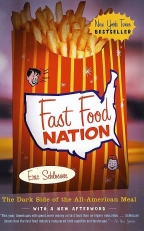Fast Food Nation
Eric Schlosser
Perennial / Harper Collins
US Trade Paperback Second Edition
ISBN 0-060-93845-5
Publication Date: 01-08-2002
383 Pages; $13.95
Date Reviewed: 05-15-03
Reviewed by: Rick Kleffel © 2003

REFERENCES
COLUMNS
|
|
|
Fast Food NationEric SchlosserPerennial / Harper CollinsUS Trade Paperback Second EditionISBN 0-060-93845-5Publication Date: 01-08-2002383 Pages; $13.95Date Reviewed: 05-15-03Reviewed by: Rick Kleffel © 2003 |
|
|
REFERENCES |
COLUMNS |
Few books have had the impact of Eric Schlosser's 'Fast Food Nation'. Upon its publication, the fortunes of all the top providers of fast food began a steady decline. While the book itself provides plenty of reasons outside of its own publication for this decline, 'Fast Food Nation' is a significant social event. No matter how you want to slice, dice or serve it, it proves that Americans still have an appetite for reading, and an ability to understand what they read. Moreover, when the arguments are presented with the clarity and skill that Schosser brings to his work, people can still be moved by a book. Usually, when one speaks of being moved by a book, one thinks of tears or laughter. These emotions, powerful as they may be, don't often have much impact in the social arena. Schlosser's work of news journalism moved people's money away from the fast food chains that had become accustomed to their faces. Making people laugh or cry is nice, it requires skill, and it demonstrates power. Making people walk away from fast food restaurants demonstrates another type and level of power. It's the power of hope.
Readers of 'Fast Food Nation' are likely to think that it should become a textbook in the high school curriculum. That was my thought at least - that my kids would be fascinated and drawn in by the stories behind the restaurants. It begins with an entertaining portrait of how some entrepreneurs from Southern California spawned a trend that would cross continents and enslave nations. Schlosser has an eye for characters. He knows how to spin a tale around the people involved in the proceedings, and this keeps the readers from feeling like they're being lectured to. Instead, readers are made to feel as if they're overhearing the stories of people that they might never have met, but could come to regard as friends. It's an effective tactic.
Schlosser's prose is straightforward and on the plain side. He's not going to get in his own way as he creates a powerful rhetorical structure. The simple language enables him to make more complex arguments more clearly. He can also shock the hell out of readers with his tales of corporate malfeasance, god-awful working conditions and horrific accidents and additives. But he doesn't ever stray into urban legend territory. There are nearly a hundred pages of notes, indexes and appendices. Schlosser clearly is not writing this material while sequestered in a garret. He's taken years, traveled the globe, and called on the resources of an extensive staff. Just the ability to organize and marshal the wide variety of facts that he brings to 'Fast Food Nation' is impressive.
The paperback edition of the book includes 18 pages of new material in an Afterword on the impact of mad cow disease. Having read Richard Rhodes' 'Deadly Feasts', I think he's a bit on the optimistic side as regards the presence of BSE in America, but I can cut him some slack. One of Schlosser's most powerful allies is his sense of hope. He doesn't just lord over doom and gloom. He offers real hope of real change in his narrative. The remarkable effect of his book only inspires more hope. Perhaps the most important reason to read 'Fast Food Nation' is to experience an example of reading something that made a difference. Long ago, literacy was heralded as the most basic requirement to maintain liberty. In our ever more illiterate world, seeing the power of reading writ large upon the political and economic landscape lends credence to that old assumption. We're reminded that reading is not just an act of freedom, but an exercise of power.